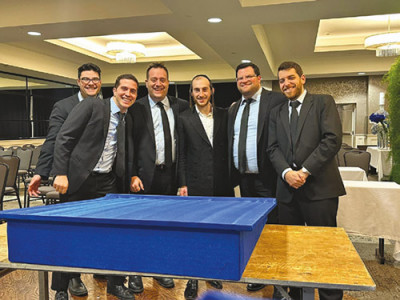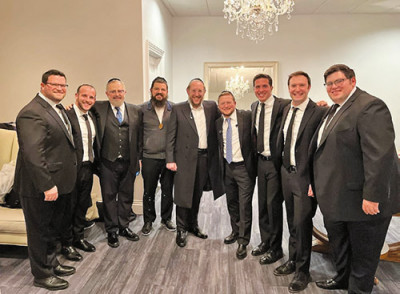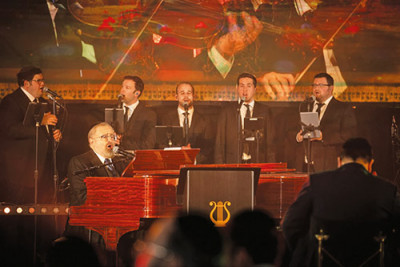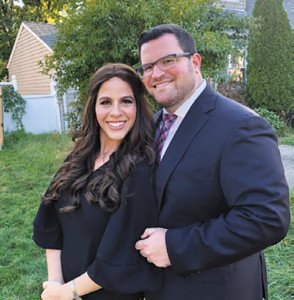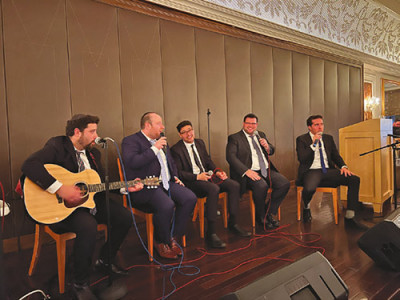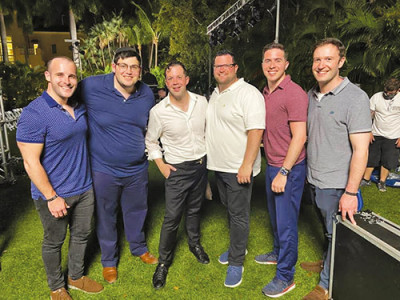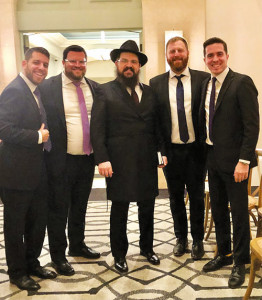
Meir Popowitz, a vocalist and chazan who has joined many of today’s Jewish musical acts on stage for many kinds of events and concerts, has sung at quite a few weddings over the last few years, and has noticed something special about them. “For me, music is what makes a wedding,” he said.
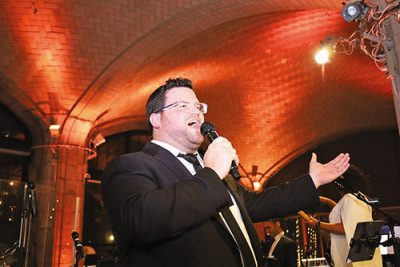
Not to downplay the importance of flowers, clothing or the food, but music is what Popowitz believes sets every event apart and is something that everyone remembers. “I love the energy and excitement the music and singing brings to everyone at a wedding. From the chuppah to the dance floor, it brings joy to not only the chatan and kallah, but everyone in the room,” he told The Jewish Link.
Popowitz grew up with music all around him, and while he enjoys all the different kinds of work he’s had the opportunity to do, including as a staff member for The Jewish Link, he feels he expresses himself best through singing, something he gets to enjoy almost weekly as he performs in shuls and communities around the world for special smachot, shabbatonim and occasionally multiple times a week at weddings. “I love the opportunity to perform with instrumental accompaniment. When you’re at a wedding, the overall sound and energy is great. I get a lot of satisfaction knowing that I got the crowd on their feet,” he said.
Popowitz comes from a highly musical family. “My grandfather, Chazan David Rosenzweig, a”h, was a shul cantor in Spring Valley, New York for over 30 years, and I would always love listening and following along as he performed in concerts and regular Shabbos davenings. He studied together with the well-known Moshe Koussevitzky, a“h, as well as other chazanim such as Leibele Waldman, a”h, and Dovid Koussevitzky, a”h, just to name a few. My father and brother, as well, are beloved baalei tefillah in our community shuls.”
He also considers Avraham Fried, Mordechai Ben David, Yaakov Shwekey and Miami Boys Choir all strong and foundational professional inspirations. Originally from Kew Gardens Hills, Queens, Popowitz grew up listening to a wide variety of Jewish music, notably Abie Rotenberg’s “D’veykus” and “Journeys” albums. (Fun fact: Popowitz’s father, Moish, was a roommate of Rotenberg’s while in their yeshiva days at Chofetz Chaim in Israel and recorded songs as part of the choir for the first two “D’veykus” albums.)
“My appreciation for chazanut and the way in which the singing and tefillot come together is a thing of beauty,”
Popowitz said.
The singer now lives in Teaneck with his wife, Alana, originally from Detroit, who is an assistant teacher at RYNJ’s preschool and a licensed massage therapist for women only, specializing in Swedish and prenatal massage and is currently taking new clients.
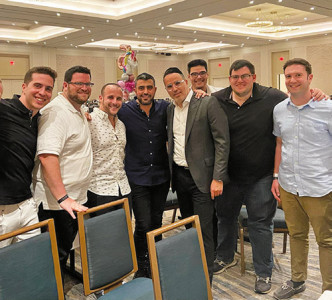
Popowitz has a standard yeshiva-bachur-from-Queens resume, but with a musical twist: He sang in his elementary school and middle school choirs at Yeshiva Tiferes Moshe, then went on to MTA for high school, spent two years at Yeshivat Shaalvim, one year at YU, and finished off his final two years at Lander College for Men. “I was in the camp choir at Sdei Chemed International, at the time run by Director Rabbi Eli Teitelbaum, a”h. I worked at Camp Mesorah for three summers where I led the boys’ campus in the Zimriyah sing-off, and then I worked at Camp HASC for four summers where I sang for fun with a group of friends. We called ourselves HASCapella.”
Professionally, when he’s not working at The Jewish Link, Popowitz works as a baal tefilla and vocalist on Shabbat and Yom Tov, and can lein from the Torah when asked. He has sung at many Pesach programs over the years, and sings often with different a cappella groups, mostly with his own group “JTunes,” which performs in various communities for musical Shabbatot.
In recent years, Popowitz has had many career highlights, among them singing together or in concert (ex: HASC, Makor [Jewish Music Hall of Fame], Ohel and others), with many of today’s high profile Jewish music artists: Mordechai Shapiro, Simcha Leiner, Benny Friedman, Avraham Fried, Eitan Katz, Abie Rotenberg, Eli Gerstner, Baruch Levine, Yaakov Shwekey, Ohad Moskowitz, Shulem and Yanky Lemmer, Six13, Kol Zimra and many others. He enjoys working as a baal tefilla for smachot, and spends as many as three or four Shabbatot a month in various communities celebrating bar or bat mitzvot, Shabbat sheva brachot and aufrufs. For the past four years, he has also been the baal tefillah for the Yomim Noraim at the Young Israel of New Rochelle, a role he greatly enjoys and is honored to be able to do.
These days, Popowitz has gained the comfort level to develop the ability to match his performance to virtually every type of chuppah or event. “For example, I sang at a chasidish wedding and then have moved all the way across the spectrum to traditional weddings. While generally I am singing Hebrew or Jewish music, I tailor my selections and style for pretty much any Jewish audience.”
In addition to singing, Popowitz is a voice-over recording artist, most recently working with the media organization Toveedo, an app and website that has a wide variety of educational, fun entertainment for young, frum children presented in a safe, ad-free space. Toveedo ensures the content they create is up to Torah values. “I have fun with this because I can do a lot of different voices.”
Popowitz also was recently asked to apply his skills to the next generation, and has begun teaching, particularly in training bar mitzvah students to daven from the amud and lein.
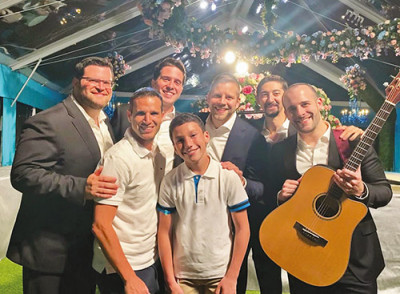
What holds all these roles together, Popowitz shared, is the experience of affecting an entire crowd. “The feeling I get when I sing and lead a kehilla is a great sense of accomplishment, that people are enjoying it—that it’s moving for them. I have a sense of fulfillment when I perform for other people, going back to when I was a young kid. You know how some people have a fear or are nervous speaking in public? There’s this level of confidence required, borne of experience, and people coming over to me and telling me they’ve enjoyed it, but over many years it’s become something I am very comfortable with.”
Most fulfilling, Popowitz said, is when he improves a particular davening experience for someone, or moves them to feel joyful or change a habit. “A few weeks ago on Shabbos, I was in Rinat davening at a simcha, and a few people came over to me and told me they specifically enjoyed my style of davening or singing. I am often told by people who come to shul only occasionally, that ‘I would come to shul more often if it sounded like this.’ That’s not just a big confidence boost, it’s the power of music. It really energizes people and refreshes them.”
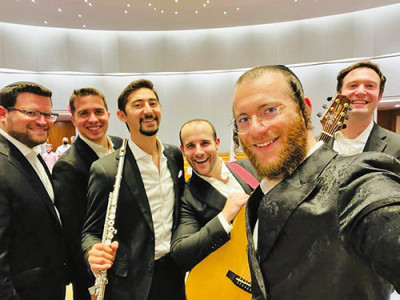
For bookings and more information, Popowitz can be reached at 917-974-0176 or meir.popowitz@gmail.com or via his Instagram handle “@meirpop.”
By Elizabeth Kratz
